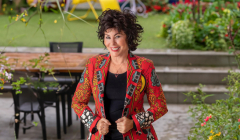
‘Being frazzled in the workplace has been dangerously normalised’
Comedian and actress Ruby Wax, Founder of mental health charity Frazzled, on taking stress seriously.

Ogilvy's IWD 2020 event set out to explore unconscious bias, what it is, where it materialises and the practical steps individuals and businesses can take to reduce its presence and impact.

“Create a movement around a community; then you can create change,” was the powerful closing comment from Nadja Bellan-White, Executive Partner and WPP Team Leader at Ogilvy UK’s event for IWD 2020. The event set out to explore unconscious bias, what it is, where it materialises and practical steps individuals and businesses can take to reduce its presence and impact.
Pete Dyson, a behavioural change scientist at Ogilvy, explained what unconscious bias is and how it affects people. “The question isn’t whether we have bias; it’s a case of which bias we have,” he said.
One of the problems with tackling bias is that it lives in the margins. As Dyson says: “the marginal differences make a big impact.” He pointed out that a bias of just 1% can equate to an office gender split of 65% men to 35% women. Ultimately, he added: “we see the world through context. Remove the context and you realise we’re much more similar than we are different.”
We need to foster a culture where we have challenging conversations without fear of retribution.
Nova Reid
Shelina Janmohamed, Vice President of Islamic Marketing at Ogilvy UK built on Dyson’s learnings and highlighting the lived reality of unconscious bias through a wide-ranging discussion. Nova Reid, a diversity campaigner and culture change consultant spoke about the limitations that have always been placed on her because of the intersection of her gender and race. She believes that it is not enough to invite people into the room. As she explained: “we need to foster a culture where we have challenging conversations without fear of retribution.”
These conversations are something that Bellan-White also believes are vital to seeing real progress take place in the workplace. She said that throughout her career, she’s always tried to stand up for what’s right, explaining: “it’s hurt my career but I’m not going to tolerate any kind of bias as long as I’m in the room.” While she has accepted the individual responsibility for speaking up, often feeling quite isolated in the process, Bellan-White wants to see everyone involved. “It’s a shared responsibility,” she adds.
The main problem with advertising is that it’s not representative of who we are as a nation.
Joyce Kremer
For Charlie Craggs, transgender activist, author and Founder of Nail Transphobia, the problem lies in women’s in-built lack of desire to speak up. She wants women to “stop being so polite.” She believes that, while women supporting women is important, everyone needs to stand up for one another, particularly for the marginalised communities: “we need allies to step up.” Craggs believes that it’s the representation behind the camera that matters as much as in front of it. “You can smell when it’s a room full of people not from those communities,” she adds.
Joyce Kremer, a creative at Ogilvy and the 2020 President of She Says UK feels that the fundamental issue lies in the make-up of the creative industries. As she explained: “the main problem with advertising is that it’s not representative of who we are as a nation.”
Kremer shared the campaign that She Says have created for this year’s IWD, which highlights the reality that contracts for men and women aren’t equal, particularly where it comes to parental leave. “It’s a vicious cycle we’re all caught up in,” she added. As such, She Says are inviting people to write to their CEOs, asking them to review paternal leave policies. As Dyson ended with, the way to further the conversation is by everyone being “more open and transparent.”
Looks like you need to create a Creativebrief account to perform this action.
Create account Sign inLooks like you need to create a Creativebrief account to perform this action.
Create account Sign in